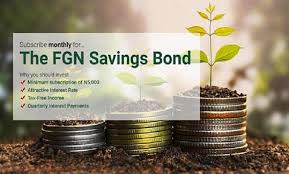The Debt Management Office (DMO) has announced the opening of subscriptions for two Federal Government of Nigeria (FGN) Savings Bonds starting today, Monday, June 2, 2025. The retail-targeted bonds, priced at ₦1,000 per unit, come with interest rates of 16.121% and 17.121% per annum for two-year and three-year tenors respectively.
In a statement released via its official X (formerly Twitter) handle, the DMO confirmed that the subscription window will remain open until Friday, June 6, 2025. The settlement date is set for June 11, 2025, while investors will receive quarterly coupon payments on September 11, December 11, March 11, and June 11 throughout the bond duration.
The two-year bond will mature on June 11, 2027, while the three-year bond will mature on June 11, 2028. These savings bonds are designed primarily for retail investors and are seen as a secure investment option with guaranteed quarterly returns and principal repayment at maturity.
According to the DMO, “They are offered at ₦1,000 per unit subject to a minimum subscription of ₦5,000 and in multiples of ₦1,000 thereafter, subject to a maximum subscription of ₦50 million.”
The DMO added that the bonds are fully backed by the full faith and credit of the Federal Government and are charged upon the general assets of the nation. This gives the bonds a high level of security, making them eligible for investment by trustees under the Trustees Investment Act.
Additionally, the savings bonds qualify as government securities under the Company Income Tax Act and Personal Income Tax Act, offering tax benefits to investors, including pension fund administrators. The bonds are also listed on the Nigerian Exchange Limited (NGX), enhancing their liquidity and making them eligible assets for liquidity ratio calculations for banks.
Despite the attractive interest rates, concerns remain over the overall investor appetite for short- to medium-term government debt instruments. The DMO recently struggled to raise its target of ₦300 billion at its May 2025 FGN bond auction, closing with ₦295.98 billion due to low demand for five-year bonds maturing in April 2029. That particular tranche was undersubscribed by as much as 83%.
The waning interest in short-term bonds is attributed to investor preference for longer-term instruments amid high inflation and economic uncertainty. Some analysts suggest that retail investors are becoming more cautious, demanding higher yields for shorter tenures, while institutional investors are repositioning towards longer-duration investments for stability and better returns.
Nonetheless, the Federal Government continues to rely heavily on domestic borrowings to finance its record budget deficit of ₦13 trillion for 2025. As of the end of Q1 2025, the government had borrowed a total of ₦1.94 trillion from the domestic bond market, highlighting the significance of such instruments in bridging Nigeria’s fiscal gap.
The new FGN Savings Bonds offer a more accessible entry point for average Nigerians looking to invest in government securities. With a minimum entry of ₦5,000, the bonds are positioned as an inclusive tool for financial participation and savings.
Experts believe that while the interest rates offered are competitive, the overall success of this round of bond sales will depend largely on market sentiment, inflation expectations, and clarity around government fiscal and monetary policy.
The DMO has urged Nigerians, particularly retail investors, to take advantage of the opportunity to invest in these low-risk government-backed instruments, promising stable returns and regular income. Whether the attractive rates are enough to draw investors amid current economic headwinds remains to be seen.
